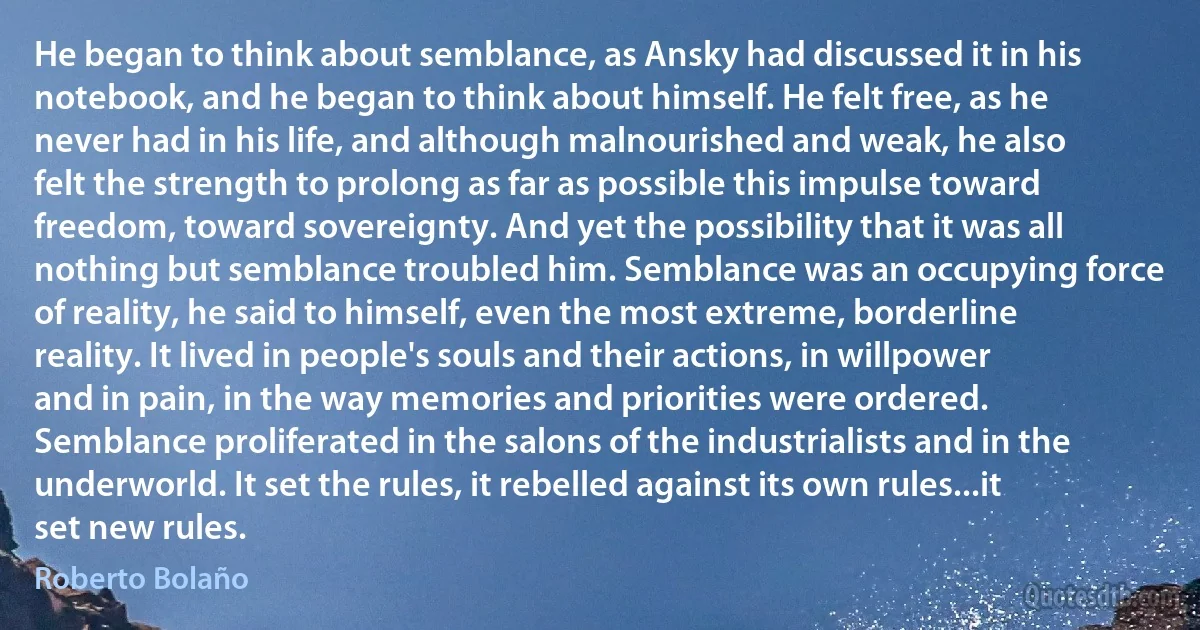
He began to think about semblance, as Ansky had discussed it in his notebook, and he began to think about himself. He felt free, as he never had in his life, and although malnourished and weak, he also felt the strength to prolong as far as possible this impulse toward freedom, toward sovereignty. And yet the possibility that it was all nothing but semblance troubled him. Semblance was an occupying force of reality, he said to himself, even the most extreme, borderline reality. It lived in people's souls and their actions, in willpower and in pain, in the way memories and priorities were ordered. Semblance proliferated in the salons of the industrialists and in the underworld. It set the rules, it rebelled against its own rules...it set new rules.
Roberto BolañoRelated topics
begin far felt force free freedom life notebook nothing pain possibility possible say set sovereignty strength think underworld way yet borderline willpower rulesRelated quotes
.. I went to live in my studio on the first of May [? ]... I have not had a hot dinner more than perhaps six or seven times since. I have lived then and I do so here, not having money for dinner, because the work costs me too much and I have trusted too much on my being strong enough to hold out. Now I have made it worse by smoking a great deal, which I do the more because then one does not feel an empty stomach so much... My opinion is that one must not think that the people whose health is damaged, quite or partly, are no good for painting... It fell so unexpectedly on me, I had been feeling weak and feverish, but I went on notwithstanding, but I began to feel worried when more and more teeth broke off, and I began to look more and more ill.

Vincent van Gogh
Centuries ago, when I first stood on that little boulevard stage in Paris - when I saw the happy faces, when I heard applause - I felt as if my body and soul had found their destiny; I felt as if every promise in my birth and childhood had begun its fulfillment at last.
Oh, there were other actors, worse and better; other singers; other clowns; there have been a million since and a million will come after this moment. But each of us shines with his own inimitable power; each of us comes alive in his own unique and dazzling moment; each of us has his chance to vanquish the others forever in the eye of the beholder, and that is the only kind of accomplishment I can really understand: the kind of accomplishment in which the self-this self, if you will - is utterly whole and triumphant.

Anne Rice
I too was filled with a sort of shyness and fear, as I was called to leave 'the world of will and idea' in which I had lived and created, and in whose reality I had believed. But the happy liberating touch of non-objectivity drew me out into the 'desert' where only feeling is real.. ..and so feeling became the content of my life. It was no 'empty square' I had exhibited but the feeling of non-objectivity. I perceived that the 'thing' and the 'idea' were taken to be equivalents of feeling, and understood the lie of the world of will and idea. Is the milk bottle the symbol of milk? Suprematism is the rediscovery of that pure art which in the course of time, and by an accretion of 'things', had been lost to sight.

Kazimir Malevich
It becomes logical to ask where the idea originates that the rules of the game of life ought to be such that those who are weak, disabled or ill should be helped?
One answer is obvious: this is the game typically played in childhood. Every one of us was, at one time, a weak and helpless child, cared for by adults: without such help we would not have survived and become adults.
Another, almost equally obvious answer is that the prescription of a help-giving attitude toward the weak is embodied in the dominant religions of Western man.
Judaism, and especially Christianity, teach these rules by means of parable and prohibition, example and exhortation, and by every other means available to their representatives.

Thomas Szasz
Quite all right, sir. Plenty of time. You have a sleep, sir.'
Hood turned over with his fat bottom towards Nabby Adams. Thank God. Nabby Adams tiptoed over again to the serving-hatch, ordered another, downed it. He began to feel a great deal better. After yet another he felt better still. Poor old Robin Hood wasn't such a bad type. Stupid, didn't know a gear-box from a spare tyre, but he meant well. The world generally looked better. The sun shone, the palms shook in the faint breeze, a really lovely Malay girl passed by the window. Proud of carriage, in tight baju and rich sarong, she balanced voluptuous haunches. Her blue-black hair had some sort of a flower in it; how delicate the warm brown of her flat flower-like face.
‘What time is it, Nabby?'....

Anthony Burgess
